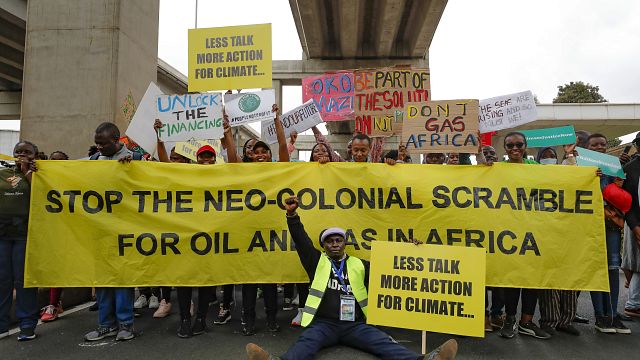Activists demonstrate against Africa Climate Summit in Nairobi

Hundreds of people joined a ‘people’s march’ on climate in streets of the Kenyan capital, as the African climate summit kicked off in Nairobi on Monday (Sep. 04).
Demonstrators, flanked by a marching band, held a demonstration near the conference against what they called its “deeply compromised agenda” and focus on rich-nation interests.
There is some frustration on the continent about being asked to develop in cleaner ways than the world’s big polluters and to do it while much of the support that has been pledged hasn’t appeared.
An activist from the Friends of the earth Africa called for a reform of the entire system.
One tool that was target was carbon markets. Over the years, a countries have been invested in it. The UN defines them as “trading systems in which carbon credits are sold and bought. Companies or individuals can use carbon markets to compensate for their greenhouse gas emissions by purchasing carbon credits from entities that remove or reduce greenhouse gas emissions.”
“We are here to demand that Africa’s energy system must be de-colonised, it must be brought out from the hands of the culprits, it is time for the African people to stand together and make a demand, that what we need now is systems change, not climate change, what we need now is that Africa’s energy systemic must be de-colonised,” Babawale, Activist from friends of the earth Africa said.
It should be put in the hands of people this is not the time that we should promote a carbon markets it is not going to put to an end the different climate crisis that Africa is facing.”
Some held signs demanding the targeting of fossil fuels. “Stop the neo-colonial scramble for oil and gas in Africa,” one read. Ruto in the past has said the “addiction” to fossil fuels must end.
The first African Climate Summit is opening with heads of state and others asserting a stronger voice on a global issue that affects the continent of 1.3 billion people the most, even though they contribute to it the least.
Kenyan President William Ruto’s government and the African Union launched the ministerial session on Monday while more than a dozen heads of state began to arrive, determined to wield more global influence and bring in far more financing and support. The first speakers included young people, who demanded a bigger voice in the process.
“For a very long time we have looked at this as a problem. There are immense opportunities as well,” Ruto said of the climate crisis, speaking of multibillion-dollar economic possibilities, new financial structures, Africa’s huge mineral wealth and the ideal of shared prosperity.
“We need to immediately see the delivery of the $100 billion” of climate finance pledged annually by rich countries to developing ones, said Simon Stiell, executive secretary of the U.N. Framework Convention on Climate Change. More than $83 billion in climate financing was given to poorer countries in 2020, a 4% increase from the previous year but still short of the goal set in 2009.
Kenya alone needs $62 billion to implement its plan to reduce national emissions that contribute to global warming, the president said.
Outside attendees to the summit include the U.S. government’s climate envoy, John Kerry, and United Nations Secretary-General Antonio Guterres, who has said he will address finance as one of “the burning injustices of the climate crisis.”
“Of 20 countries most affected by the climate crisis, 17 are here in Africa,” Kerry said.
One project being protested is the TotalEnergies-funded 897-mile (1,443-kilometer) East Africa Crude Oil Pipeline in Uganda and Tanzania.
“We know that fossil fuel companies have lots of subsidies,” so more subsidies for solar power are needed to massively scale up renewable sources, said Ugandan activist Vanessa Nakate.
The U.N. has estimated that loss and damage in Africa due to climate change are projected to be between $290 billion and $440 billion in the period from 2020 to 2030, depending on the degree of warming.
Ruto’s video welcome released before the summit was heavy on tree-planting but didn’t mention his administration’s decision this year to lift a yearslong ban on commercial logging, which alarmed environmental watchdogs. The decision has been challenged in court, while the government says only mature trees in state-run plantations would be harvested.
“When a country is holding a conference like we are, we should be leading by example,” said Isaac Kalua, a local environmentalist.
Kenya derives 93% of its power from renewables and has banned single-use plastic bags, but it struggles with some other climate-friendly adaptations. Trees were chopped down to make way for the expressway that some summit attendees used to travel from the airport, and bags of charcoal made from local trees, mostly in small kilns, are found on some Nairobi street corners.
Ruto made his way to Monday’s events in a small electric car, a contrast to the usual government convoys, on streets cleared of the sometimes poorly maintained buses and vans belching smoke.
Elsewhere, nearly 600 million Africans lack access to electricity despite the vast potential for solar and other renewable power.
Other challenges for the African continent include simply being able to forecast and monitor the weather in order to avert thousands of deaths and billions of dollars in damages that, like climate change itself, have effects far beyond the continent.
“When the apocalypse happens, it will happen for all of us,” Ruto warned.
